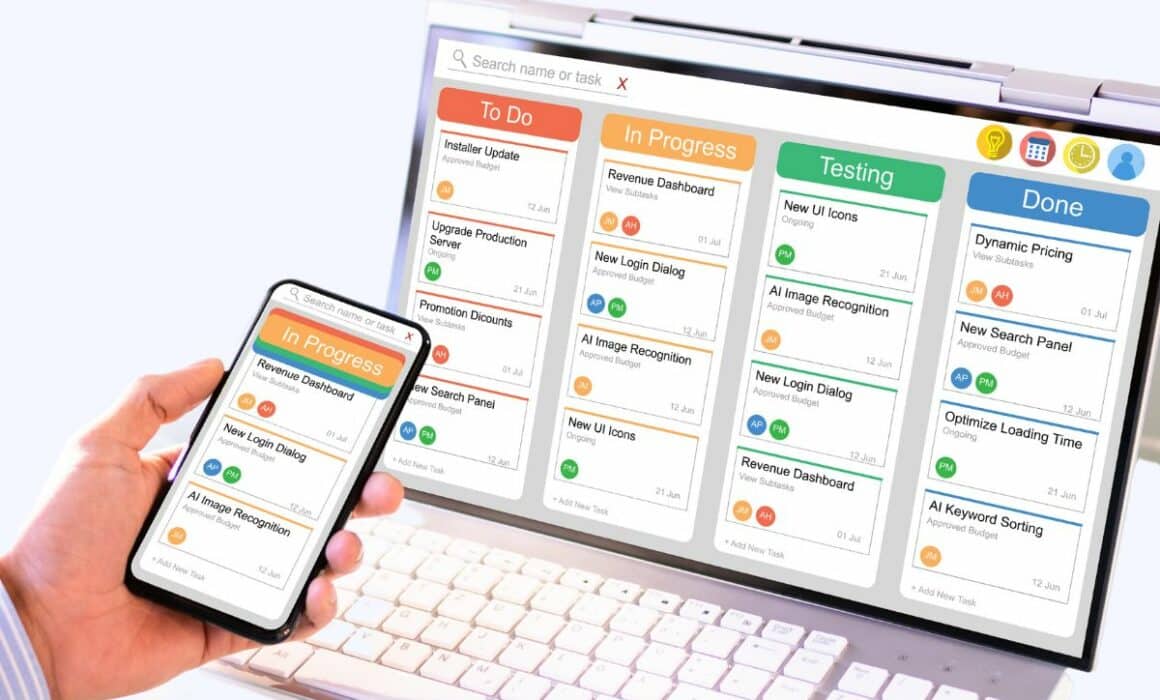Product Development Software: Best Options In 2023
Product development software is a suite of digital tools and applications designed to streamline the workflow during product development. They serve as a digital backbone for product managers for managing, collaborating, and tracking the stages of product development lifecycle. Most importantly, they enable product managers, cross-functional teams, and stakeholders to collaborate seamlessly from product conception to market launch.
Product development is a fast-paced endeavour where product teams collaborate to ideate, create, test, and deliver products. To adapt to this complex environment, product managers will need to acquire all the necessary tools to ensure everything flows down the pipeline smoothly.
You’ll need to pick the right software to ensure the success of your product development process. Because of this, our team at Mambo.io gathered the best product development tools you can use in 2023. We’ll discuss each software based on its category, pros and cons, and pricing structure.
Best product development software for project management
Asana – best for large companies and enterprises
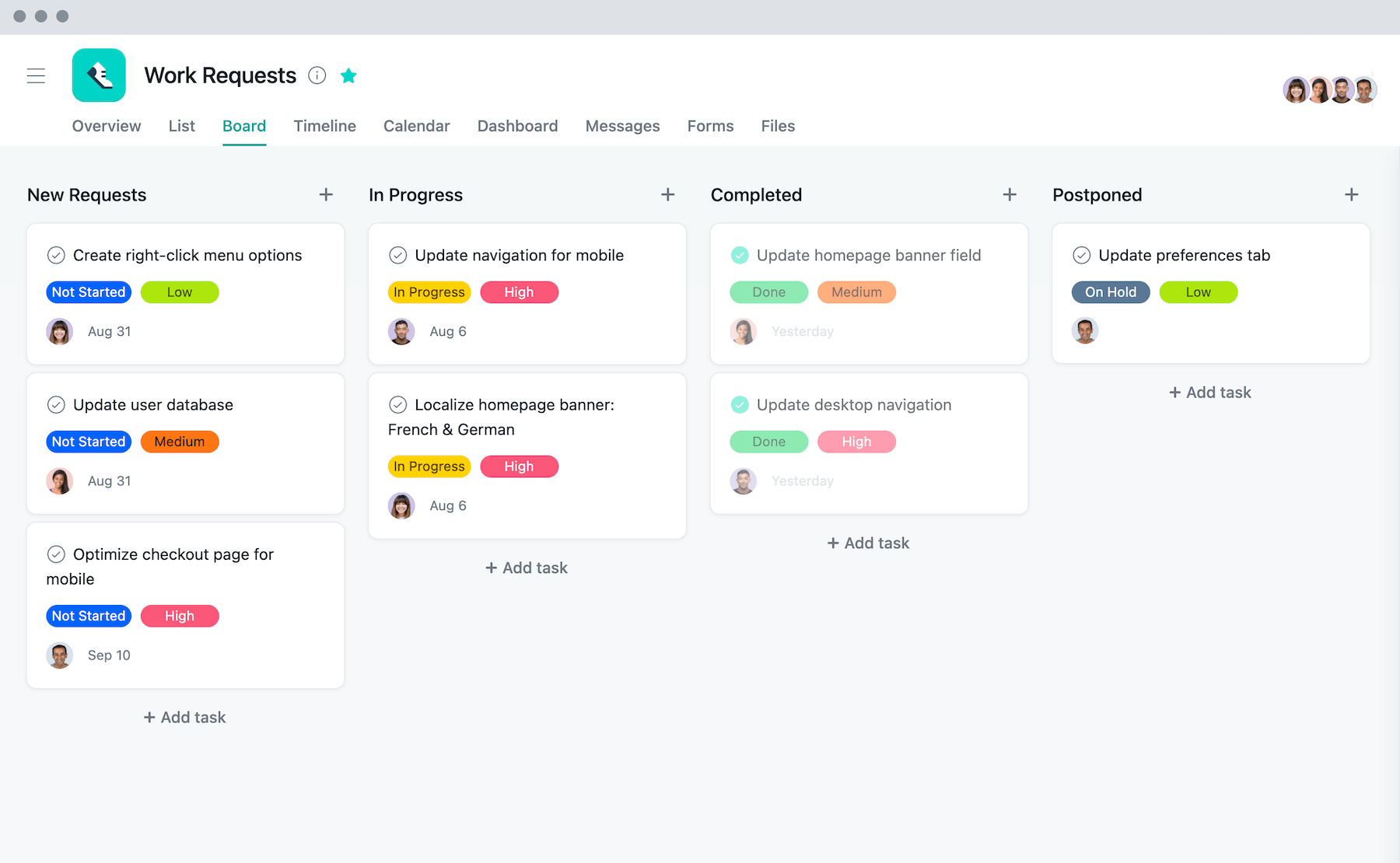
Source: Asana
Asana is one of the most popular project management software today because it helps product teams orchestrate their workloads. Trusted by renowned companies like Adobe and P&G, this product development software facilitates cross-functional collaboration across the organisation. It doesn’t matter how many stakeholders are involved with the product development process – Asana can make it work.
Project managers love using Asana because it is versatile product management software great for planning and tracking tasks and projects. Some of the key features that can help your entire development team include projects, tasks, subtasks, dependencies, and milestones.
PROS:
- Simple user interface and intuitive design
- Well-integrated to hundreds of apps
- Can automate workflow
- It comes with real-time reporting and insights
- Organised and efficient task management
CONS:
- Time tracking requires third-party app integrations
- Loaded with features
- Learning curve for new users
- You can only assign one person per task
PRICING:
- Asana Basic: Free
- Asana Premium: $10.99/member/month
- Asana Business: $24.99/member/month
- Asana Enterprise: Custom pricing
Trello – best for Kanban project management
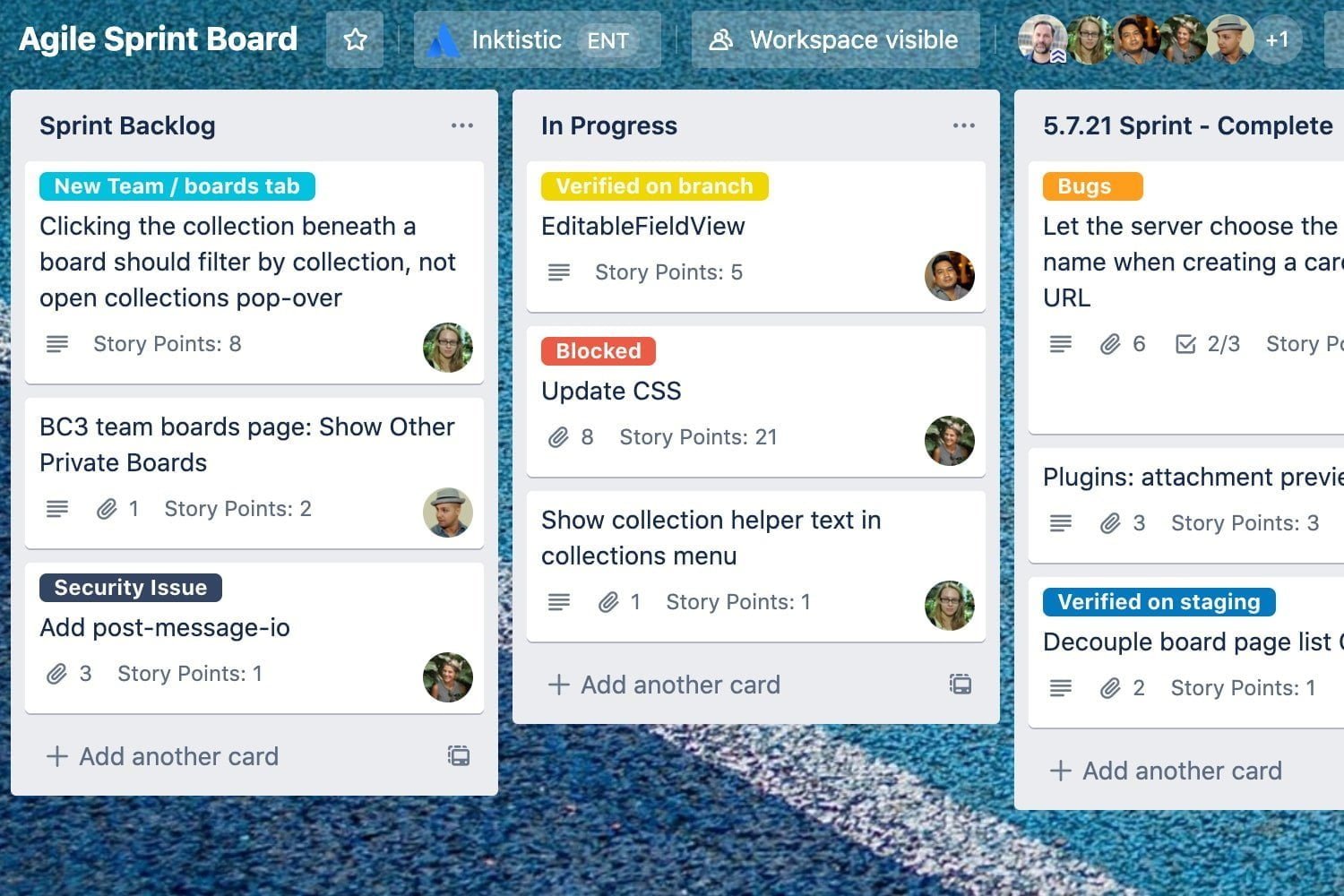
Source: Trello
Trello is a product development software designed to simplify task management and kanbanize your product development process. Its simplicity and flexibility make it an appealing product management software if you want to develop minimum viable products. This product management software allows you to easily create boards for various product development stages and move tasks across lists.
With Trello as your digital tool for project management, you can create boards, lists, and cards to manage multiple stages of product development. Choosing it as your digital project management tool will provide useful features like boards, lists, and cards. Additionally, its Kanban-style design gives everyone a clear view of what work should be prioritised to keep product development running.
PROS:
- Easy task management
- Simple and user-friendly interface
- Kanban design makes tasks more manageable
- Offers internal automation even for free accounts
- It comes with third-party customisation
CONS:
- Issues with user permission around cards
- Not ideal for large-scale product development
- Attachments are limited to 250MB per upload
- It doesn’t come with real-time reporting and analytics
- Most of the valuable extensions cost an extra
PRICING:
- Free – $0/user/month
- Standard: $5.00/user/month
- Premium: $10.00/user/month
- Enterprise: Custom pricing
Jira – best for software development
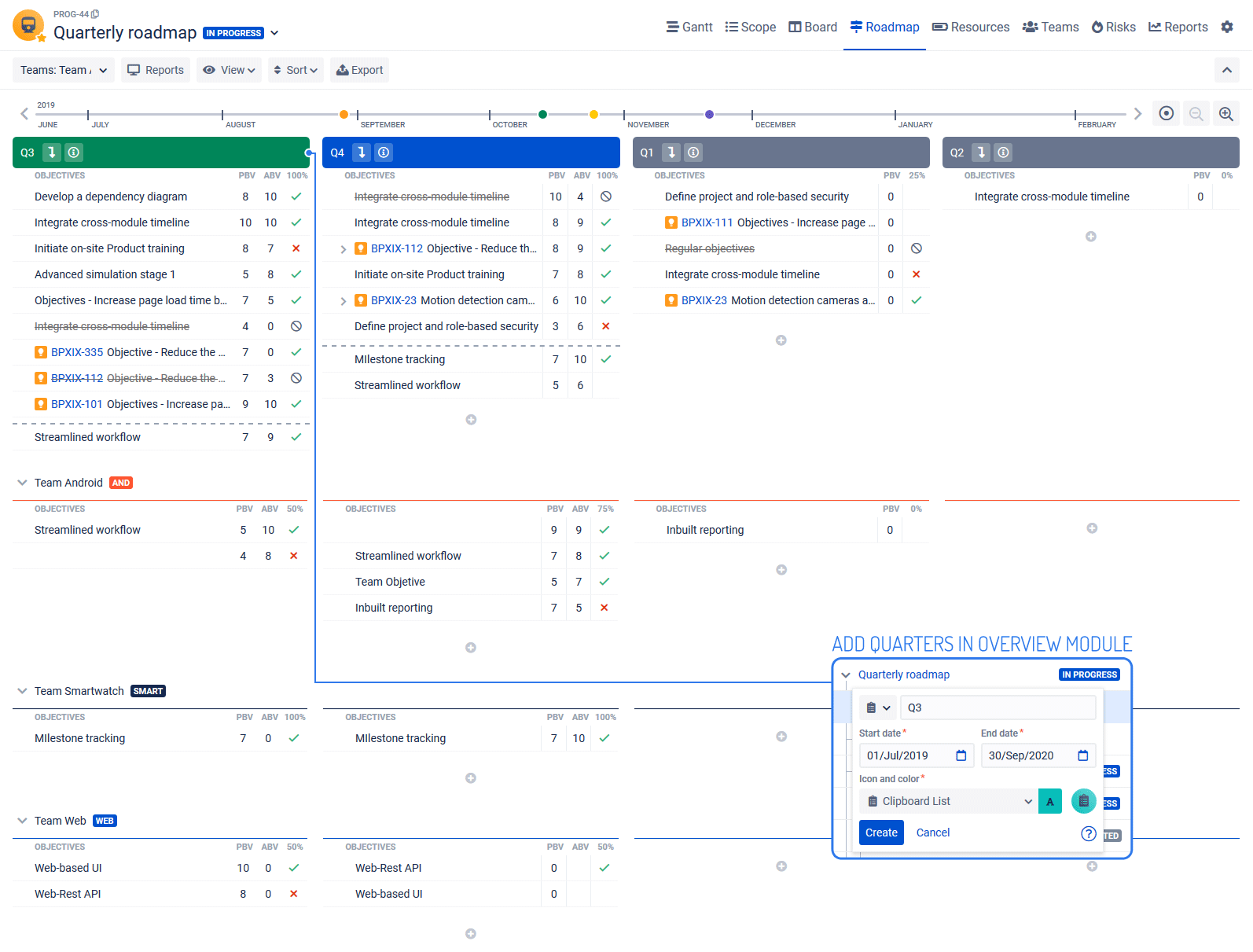
Source: Atlassian
Jira is a robust issue and project tracking tool designed by Atlassian for agile software development. This product development software is also very effective when utilised for product management. It’s also an effective product management tool agile teams can utilise to track the progress of their projects.
Jira is the ideal product management software for a large team or enterprise dealing with complex software development. It’s favoured by many product managers for its advanced features, such as sprint planning, backlog management, and customisable workflows.
PROS:
- Designed for agile and scrum management
- Great for issue management
- Highly customisable
- Powerful reporting capabilities
- 3000+ 3rd party app integrations
CONS:
- Not very user-friendly
- Limited collaboration features
- Designed for engineering and software development teams
- Customisation can be pretty complex
- Pricing offers tend to be expensive even for enterprises
PRICING:
- Free: $0/user/month
- Standard: $7.75/user/month
- Premium: $15.25/user/month
- Enterprise: Custom pricing
Best product development software for road mapping and planning
Aha! – best for road mapping
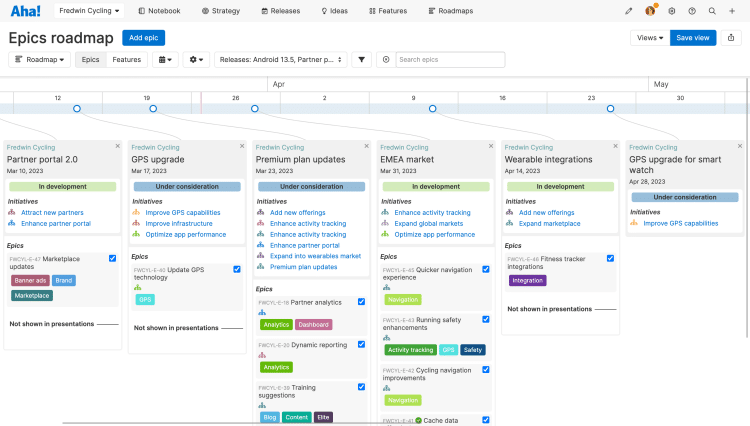
Source: Aha!
Aha! is a comprehensive product management platform focused on road mapping, strategy, and goal setting. This product development software can create visual product roadmaps, set objectives and key results (OKRs), and manage features and releases. This product development software also offers users six road mapping templates depending on their needs. With Aha!, you can easily align your product strategy with execution, making it a valuable tool for long-term planning.
PROS:
- Comprehensive integration features
- User-friendly interface
- Comes with tools for strategic planning
- Users can share and comment on ideas
CONS:
- Epics, stories, and themes don’t line up with Jira easily
- The steep learning curve for some users
- Some features are not very intuitive to use
- Navigation can be difficult
- Pricing model can be pretty expensive
PRICING:
- Premium: $59/user/month
- Enterprise: $99/user/month
- Enterprise+: $149/user/month
Productboard – best for SaaS roadmaps
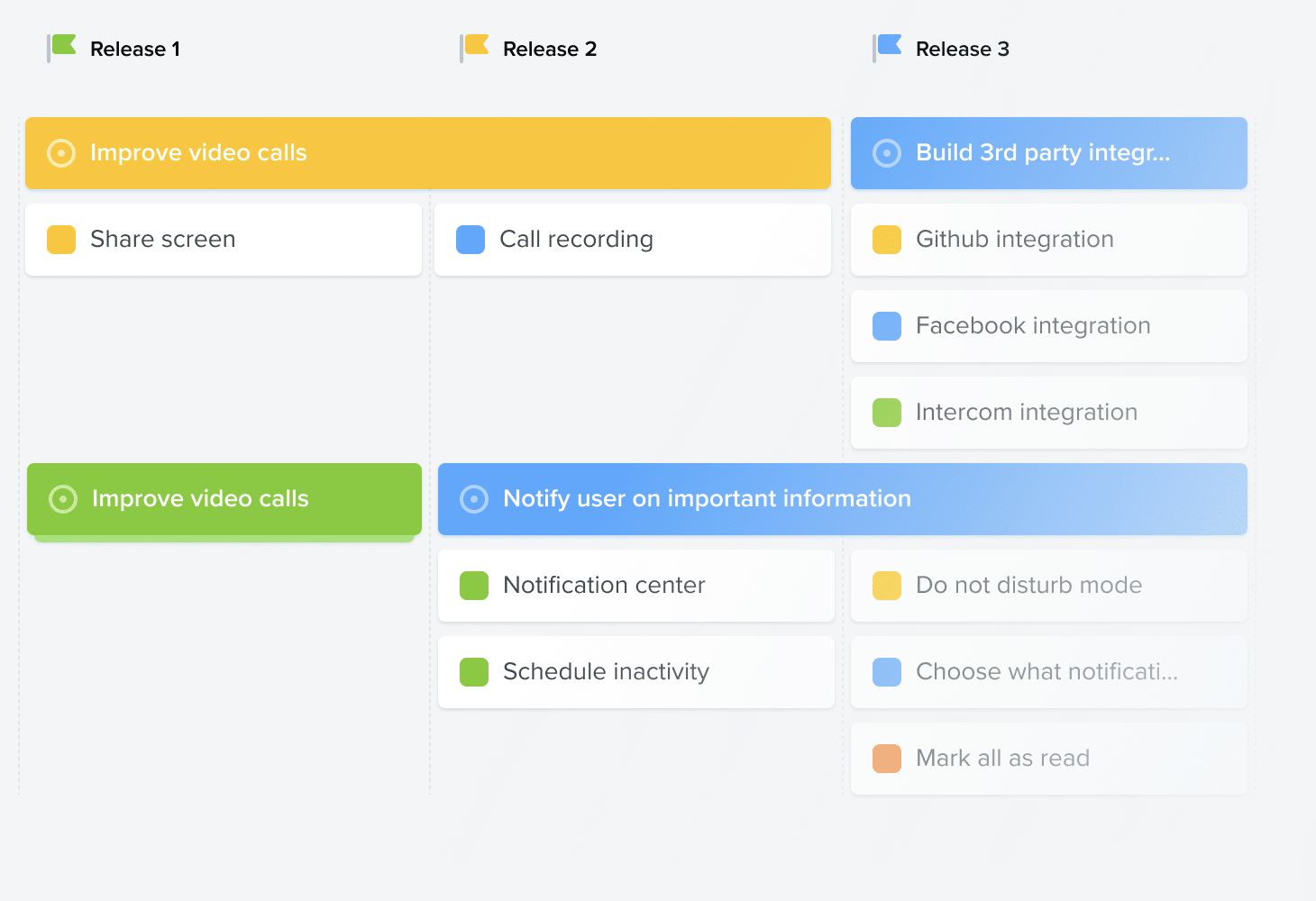
Source: Productboard
Productboard is a premium product development software that empowers product teams to turn scattered ideas into an actionable product roadmap. You can use it to create agile, Kanban, or timeline-based roadmaps and streamline your software product development process. It doesn’t matter whether you’re making a simple roadmap or a detailed release plan; Productboard can cover it for you.
This product development software also brings together product feedback and puts them all together. Once you’ve collated everything, you can prioritise feature ideas and backlogs and decide what task to work on next. More importantly, Productboard offers your entire product team an overview of the roadmap, product strategy, and feedback behind it. This level of transparency and visibility ensures agile teams are aligned with user needs during software product development.
PROS:
- Aggregates feedback from different sources into one place
- Visually pleasing roadmap views
- User-friendly interface
- Great for prioritisation
CONS:
- Steep learning curve
- Limited integrations
- Exporting options need improvement
- Almost no reporting is available
- Non-intuitive interface
PRICING:
- Essentials: $20/maker/month
- Pro: $80/maker/month
- Enterprise: Custom pricing
Best product development software for collaboration and communication
Slack – best for communication and project collaboration
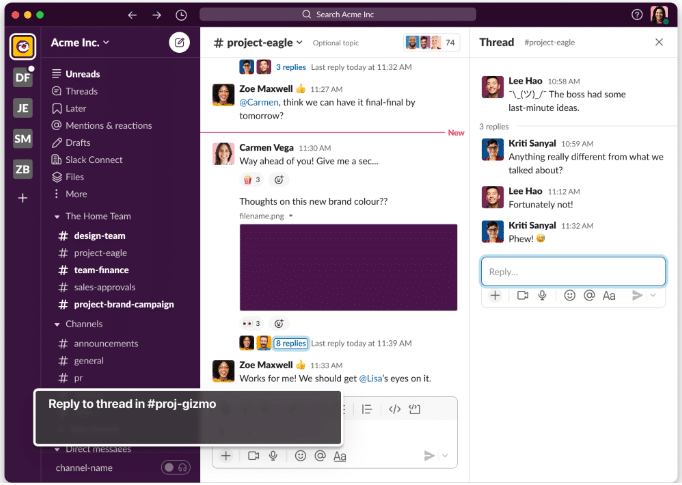
Source: Slack
Slack is arguably the most popular communication and collaboration tool many product teams use today. With this collaborative platform, product managers can create channels for specific projects or teams, facilitating focused discussions. It also has a direct messaging feature that allows team members to discuss confidential matters within themselves privately. Additionally, this free product development software also has other features that foster collaboration, including file-sharing, extensive integrations, and more.
Slack has many practical communication and collaboration features, making it one of the best product development software. When used effectively, you can run and manage your products’ entire product development lifecycle on this platform!
PROS:
- Powerful search function
- You can create different channels for your team
- Comprehensive list of integrations
- Impressive security
CONS:
- Can sometimes be distracting
- Fast-paced communications are difficult to catch up on
- Minimum file storage
- It’s easy to get overwhelmed by notifications
- Video call’s audio-visual quality needs improvement
PRICING:
- Free: $0/user/month
- Pro: $7.25/user/month
- Business+: $12.50/user/month
- Enterprise Grid: Custom pricing
Microsoft Teams – best all-around collaboration tool
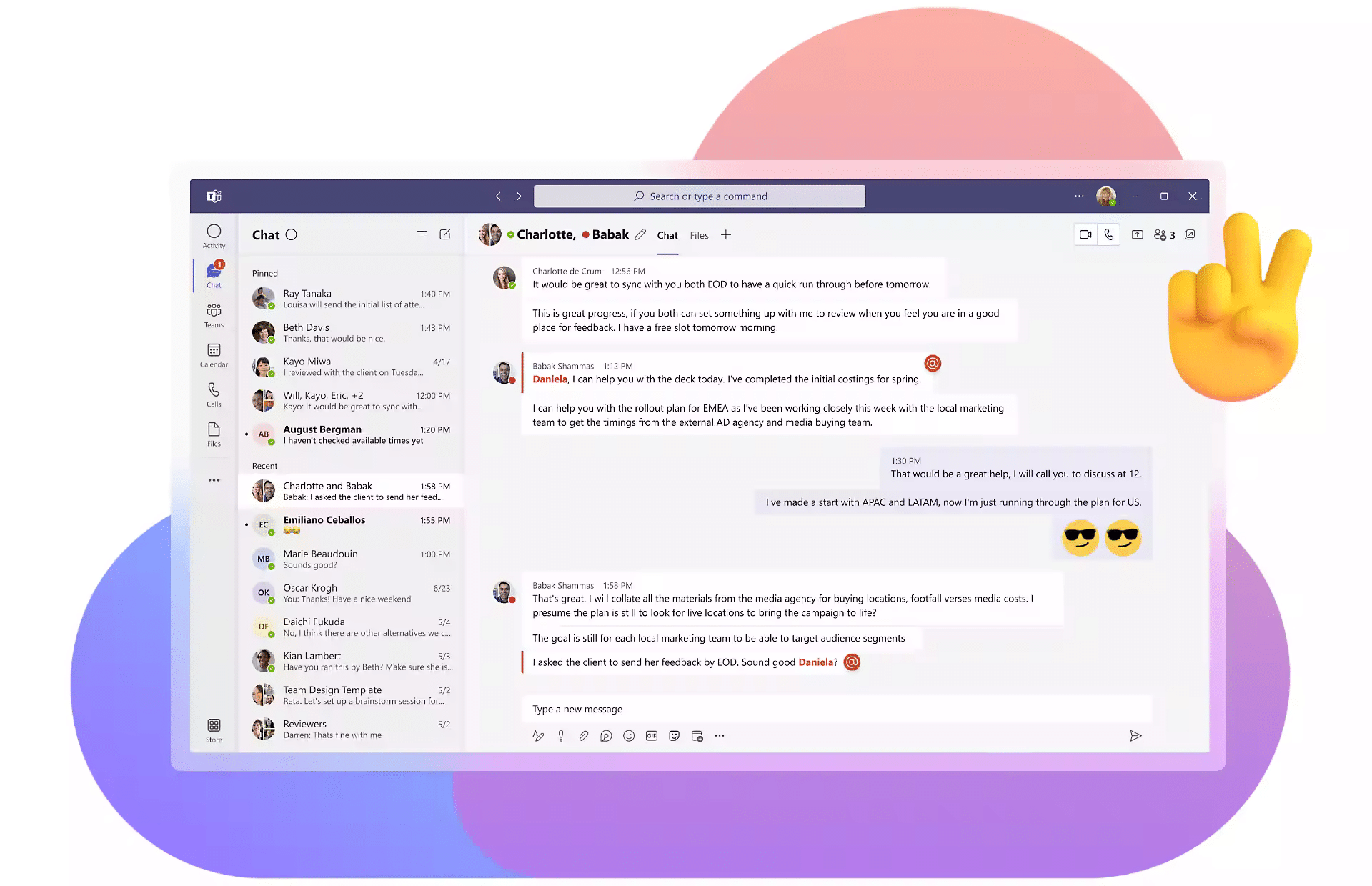
Source: Microsoft
Microsoft Teams is a powerful collaboration platform that can serve as a centralised communication hub for any development team. It offers a weighty stack of features that facilitates team communication, document sharing, and project collaboration. Moreover, its tight integration with Microsoft 365 streamlines document creation and collaboration. It offers access to apps like Word, Excel, and PowerPoint to make documentation and file sharing between peers easy.
PROS:
- It can increase focus and boost team productivity
- Cloud-based, so it’s fast and powerful
- Seamless file search
- Tight integration with Microsoft 365
- No additional costs for Microsoft 365 users
CONS:
- Online meetings are less intuitive compared to other collaboration tools
- A limited number of channels
- The flexibility and customizability might be burdensome for some users
- File structuring can be confusing
- Lacklustre mobile version
PRICING:
- Microsoft Teams Essentials: $4.00/user/month
- Microsoft 365 Business Basic: $6.00/user/month
- Microsoft 365 Business Standard: $12.00/user/month
Zoom – best for video conferencing

Source: TechRepublic
When you think about corporate video calls, you probably have Zoom as the first thought that comes to mind. And honestly, we can’t blame you! It’s one of the few success stories of the pandemic due to its impressive features. So, it’s no surprise many product developers still use it as their video conferencing tool.
Zoom is a video conferencing and online meeting solution many product managers favour. While it’s not a traditional collaboration tool, Zoom excels at one thing: video conferencing with HD-quality audio and video. It’s an invaluable product development software offering practical features to make video conferencing work. Its most notable features include scheduled meetings, waiting rooms, reminders, cloud recordings, and more.
PROS:
- Very easy to use
- High-quality video and audio
- Useful video conferencing features
- Breakout rooms for separate discussions
- Scalable for businesses of varying sizes
CONS:
- Zoombombing
- Not yet designed for 4K resolution
- The mobile app is not as intuitive as the desktop app
- Free subscription video conferencing is limited to 40 minutes
- Lack of comment control
PRICING:
- Basic: Free
- Pro: $14.99/user/month
- Business: $19.99/user/month
- Business Plus: Custom pricing
- Enterprise: Custom pricing
Best product development software for user feedback and customer insights
UserVoice – best for B2B SaaS companies
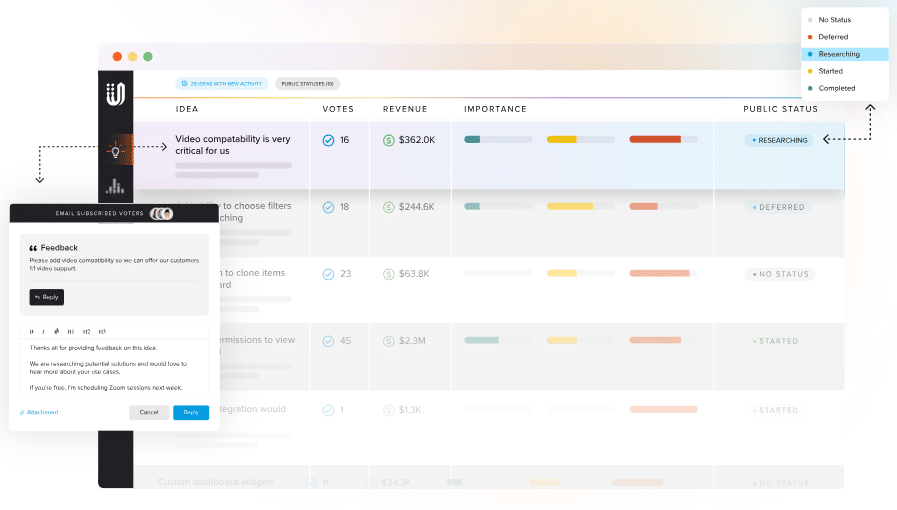
Source: UserVoice
UserVoice is a product development software that serves as a dedicated feedback board for product managers and executives. It allows them to collect and manage user feedback, prioritise feature requests, and engage with users.
With UserVoice, you can streamline your decision-making process by categorising feedback based on impact and urgency. Many B2B SaaS companies consider UserVoice their go-to product feedback tool because of its feedback-gathering capabilities. Most importantly, this product development software allows you to monitor NPS scores, assess product experience, and more.
PROS:
- Impressive customer feedback collection
- Great user engagement
- Detailed dashboard info
- Easy to navigate
- Powerful reporting and data analytics tool
CONS:
- Login issues
- Few native integrations
- No internal tool for managing feature requests
- Expensive
- Limited automation capabilities
PRICING:
- Essentials: $699/month
- Pro: $899/month
- Premium: $1349/month
- Enterprise: Custom pricing
Qualtrics – best for conducting surveys
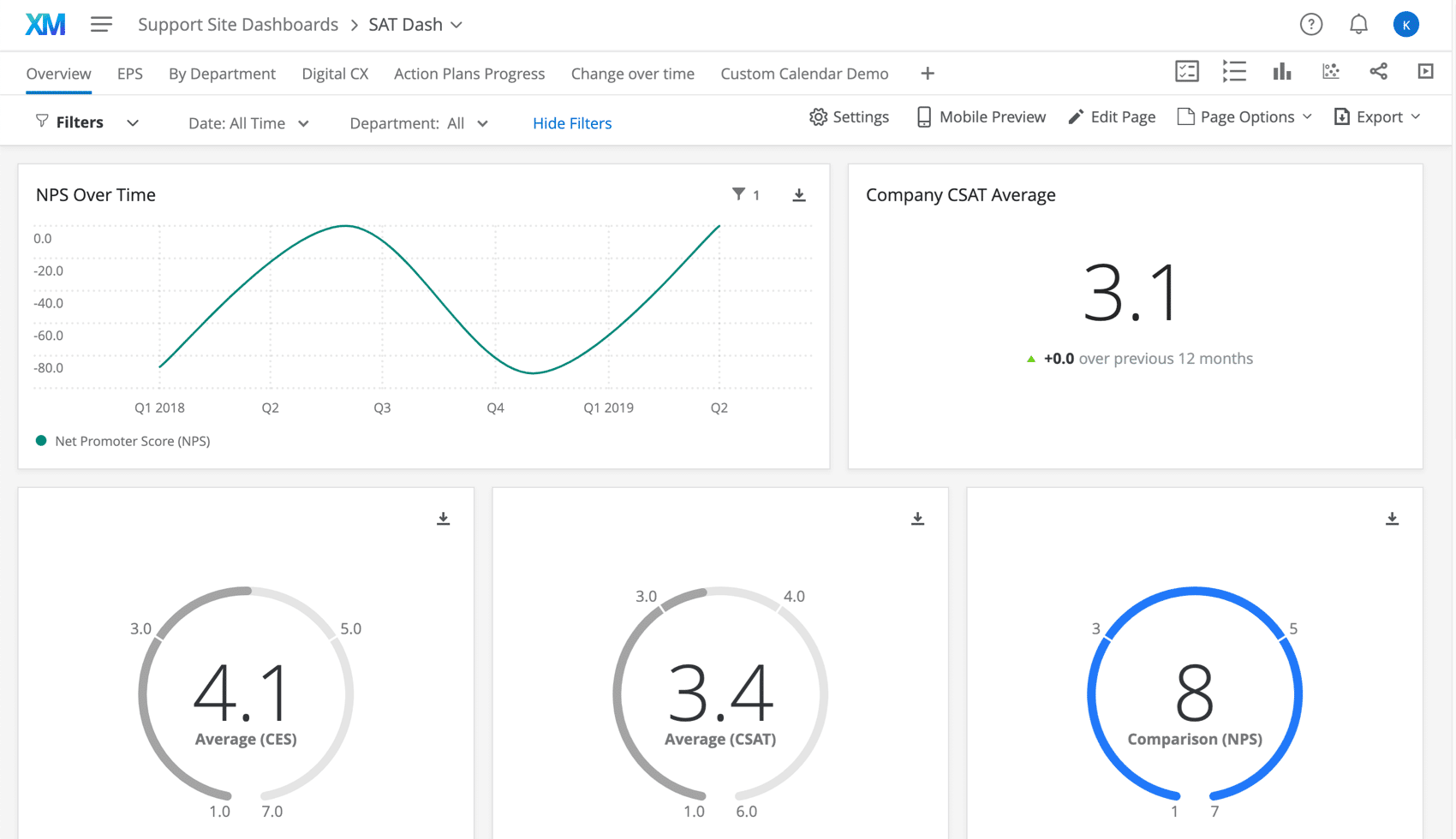
Source: Qualtrics
Qualtrics is a comprehensive experience management platform focusing on product surveys and customer feedback. It simplifies customer feedback-gathering through surveys, enabling product development teams to leverage customer insights at critical touchpoints. These insights empower teams to make informed decisions, eventually leading to a better overall user experience.
Many product teams consider this product development tool as the gold standard of survey tools. That’s because it’s packed with survey management and customisation features, such as survey builder and multilingual surveys. It also comes with advanced behavioural analytics and segmentation features to help better understand their user’s preferences and pain points.
PROS:
- Ready-to-use survey templates
- Advanced behavioural analytics
- Access to ExpertReview
- Utilises predictive analytics
- Real-time survey creation and testing
CONS:
- Only has five pre-built app integrations
- Reports load slowly when dealing with large data sets
- Panels are accessible only in the US and a few other selected countries
- Steep learning curve
- Pricing models are expensive
PRICING:
- Can go anywhere from $1,500 to $5,000 annually
Best product development software for prototyping and design
Figma – best for web design/development prototyping
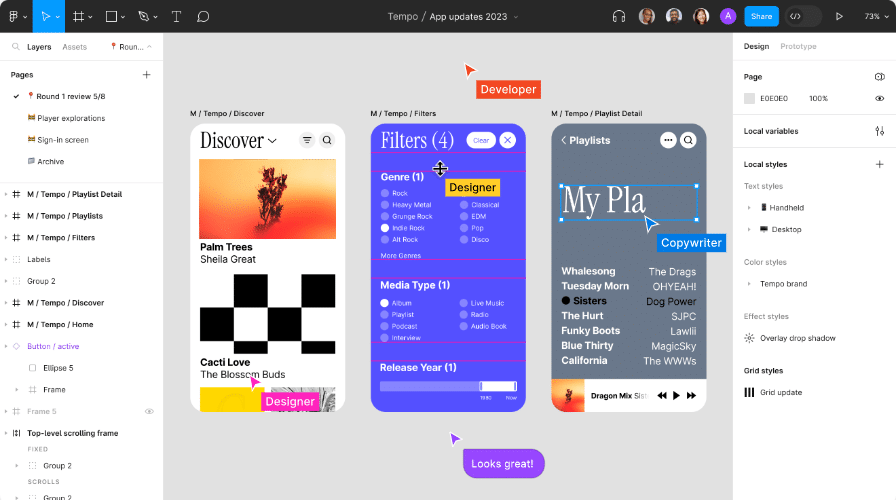
Source: Figma
Figma is a versatile and highly collaborative prototyping and design tool in the arsenal of a graphic designer, but why? That’s because this product design software focuses on allowing your development team to prototype while designing – or vice versa. With Figma, you can convert static design files into interactive prototypes without requiring you to be a coding expert.
Ultimately, this product development software empowers graphic designers and their development teams to manage a wide range of tasks seamlessly. These tasks include wireframing, product prototyping, UI design, collaboration, design system management, developer handoff, and more.
PROS:
- Cloud-based
- Low learning curve
- Supports multiple platforms
- Quick and easy file sharing
- Customisable templates
CONS:
- You can’t work offline
- The app tends to crash and freeze sometimes
- Lack of version control
- Requires necessary specs to run (RAM and graphics card)
- No global colours
PRICING:
- Starter: Free
- Figma Professional: $12/editor/month
- Figma Organisation: $45/editor/month
- Figma Enterprise: $75/editor/month
Sketch – best alternative to Figma

Source: Sketch
Most web designers consider Sketch a crucial part of their workflow – and for good reasons. This product design software focuses on allowing designers to jump into action and start creating. Many product managers even consider it as the standard for wireframing and prototyping.
Sketch is a popular design tool that allows designers to create vector-based designs and view them as clickable prototypes. Its robust vector editing system is ideal for wireframing, prototyping, and UI design tasks.
PROS:
- Shareable prototype links
- User control over who sees your work
- Extensive third-party integrations
- Works offline
CONS:
- Only available on Mac devices
- Lacklustre collaboration capabilities
- Only offers a 30-day trial instead of a free version
- Files need to be uploaded to the cloud before sharing
PRICING:
- 30-day Trial: Free
- Standard Plan: $10.00/editor/month
- Business Plan: $20/editor/month
- MacOS Licence: $120
Best product development software for data analytics
Google Analytics – best for web analytics

Source: Umami Marketing
If you’ve been in the business of making digital platforms, then you’re probably already familiar with Google Analytics. Product managers typically use it to gain valuable insights into user behaviour on their digital platforms. It’s packed with tons of neat features that allow you to track online traffic and understand user behaviour, to name a few.
One of the things that makes Google Analytics a reliable product development software is its integration with other tools. When used effectively with Google Analytics, these tools allow you to gather data throughout your product development process quickly. The best part about this product development software is its free! So don’t hesitate to use Google Analytics and its suite of features to make data-driven decisions for your digital platforms.
PROS:
- Trustworthy analytics
- Free (and always will be)
- Integrations with hundreds of other apps
- Four types of overview reports (Audience, Acquisition, Behaviour, and Conversion)
- Customisation
CONS:
- Intimidating dashboard, especially for beginners
- It doesn’t provide full details on user behaviour
- Advanced configurations require technical expertise
- The free version can be inaccurate because data sampling
- Property limits
PRICING:
- Google Analytics: Free
- Google Analytics 360: Around $12,500/month
Mixpanel – best for SaaS product analytics
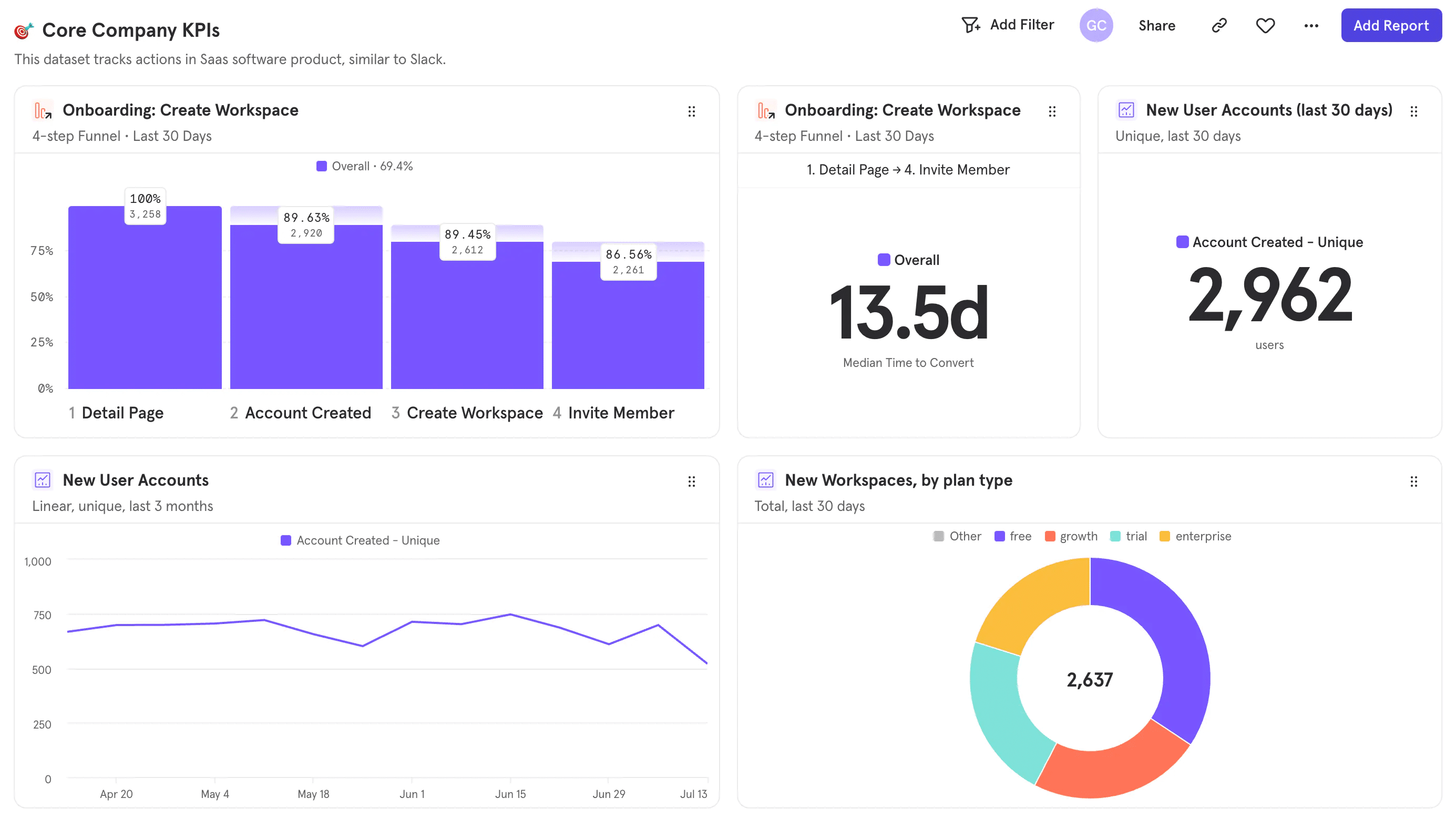
Source: Mixpanel
Mixpanel is a specialised analytics tool tailored to product analytics and behaviour analysis. It’s a practical solution for product development teams looking to measure and predict customer engagement within customised segments. Many product development teams highly favour it because it excels in providing real-time data, which is crucial for agile product development.
Most importantly, this product development software takes a different approach than other analytics platforms. Rather than analysing based on page views, it tracks the actions or steps taken by users within the monitored applications.If your organisation is willing to allocate enough engineering resources, you can maximise these user activity data to the fullest.
PROS:
- Easy funnel visualisation
- Provides user identification
- User behaviour tracking and analysis
- Report Segmentation
- Data governances
CONS:
- Cost-prohibitive
- Steep learning curve
- The free version has restricted capabilities
- Lacklustre traffic distribution
- Lack of automation
PRICING:
- Starter: Free
- Growth: $20/month
- Enterprise: $833+/month
Best product development software for version control and code collaboration
GitHub – best for cross-team version control and open-source projects

Source: Nira
GitHub is a version control and code collaboration product development software widely used by software development teams worldwide. Despite its learning curve, they typically rely on it for storing, tracking, and collaborating on software projects. Some of the notable features of this product development software include collaborative coding, automation, and CI/DC. It’s also quite a project management platform, allowing product managers to direct their software development team in the right direction.
PROS:
- Powerful git-based version control
- User-friendly interface
- Access to a large developer community
- Comprehensive integration ecosystem
- Transparency and accountability
CONS:
- The free version has limited features
- You need to pay more to access its features
- Steep learning curve
- Slow response during high-traffic periods
- Security concerns (e.g., proprietary codes)
PRICING:
- Free: $0/user/month
- Team: $3.67/user/month
- Enterprise: $19.25/user/month
GitLab – best for large DevOps and DevSecOps projects
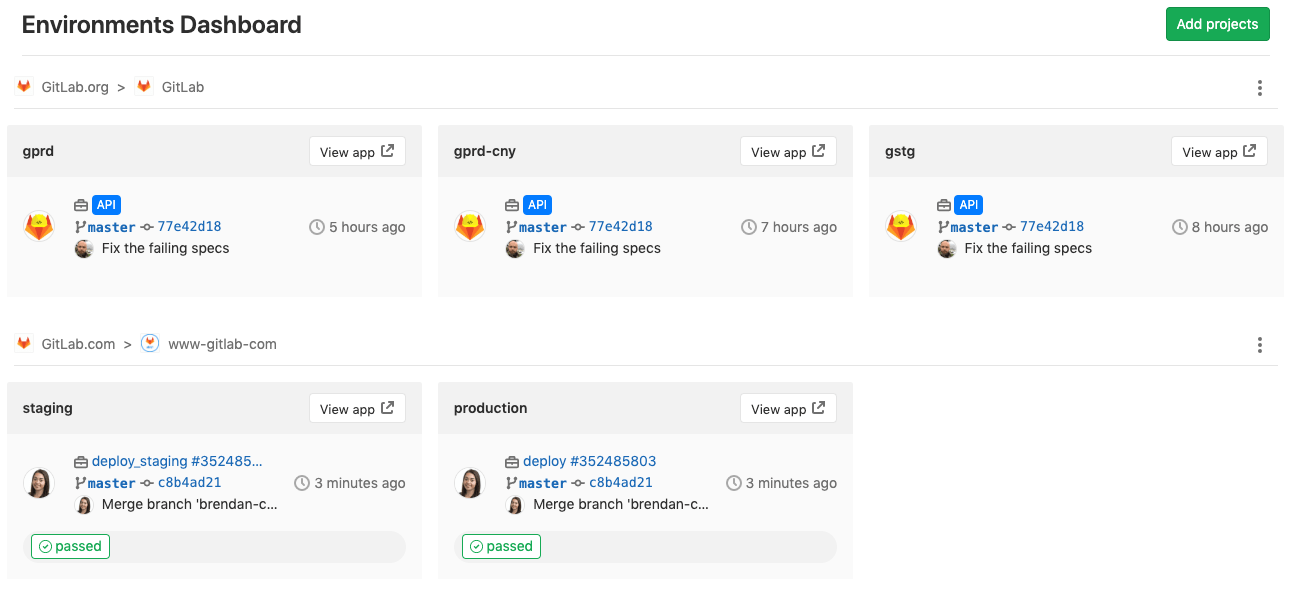
Source: GitLab
GitLab is a DevSecOps platform designed to unite teams, resulting in shorter cycle times, heightened developer efficiency, and cost reduction. This free product development software can be deployed as self-hosted or as a Saas. Some of the most notable features of Gitlab include CI/CD, source code management, feature flags, and more. Ultimately, GitLab is a repository management platform for Git that excels in almost everything needed to handle the software development life cycle.
PROS:
- All-in-one DevOps platform
- Flexible deployment (cloud-based or self-hosted)
- Active developer community
- Strong emphasis on security
- The free version comes with essential features
CONS:
- It has a learning curve
- Resource-intensive for smaller teams
- Updating and migrating servers can be challenging
- Interface is slower than the competition
- Lacklustre product management features
PRICING:
- Free: $0/user/month
- Premium: $29/user/month
- Ultimate: $99/user/month
Note: Pricing models are the same for both SaaS and self-hosted deployments.
Best product development software for product documentation and knowledge sharing
Confluence
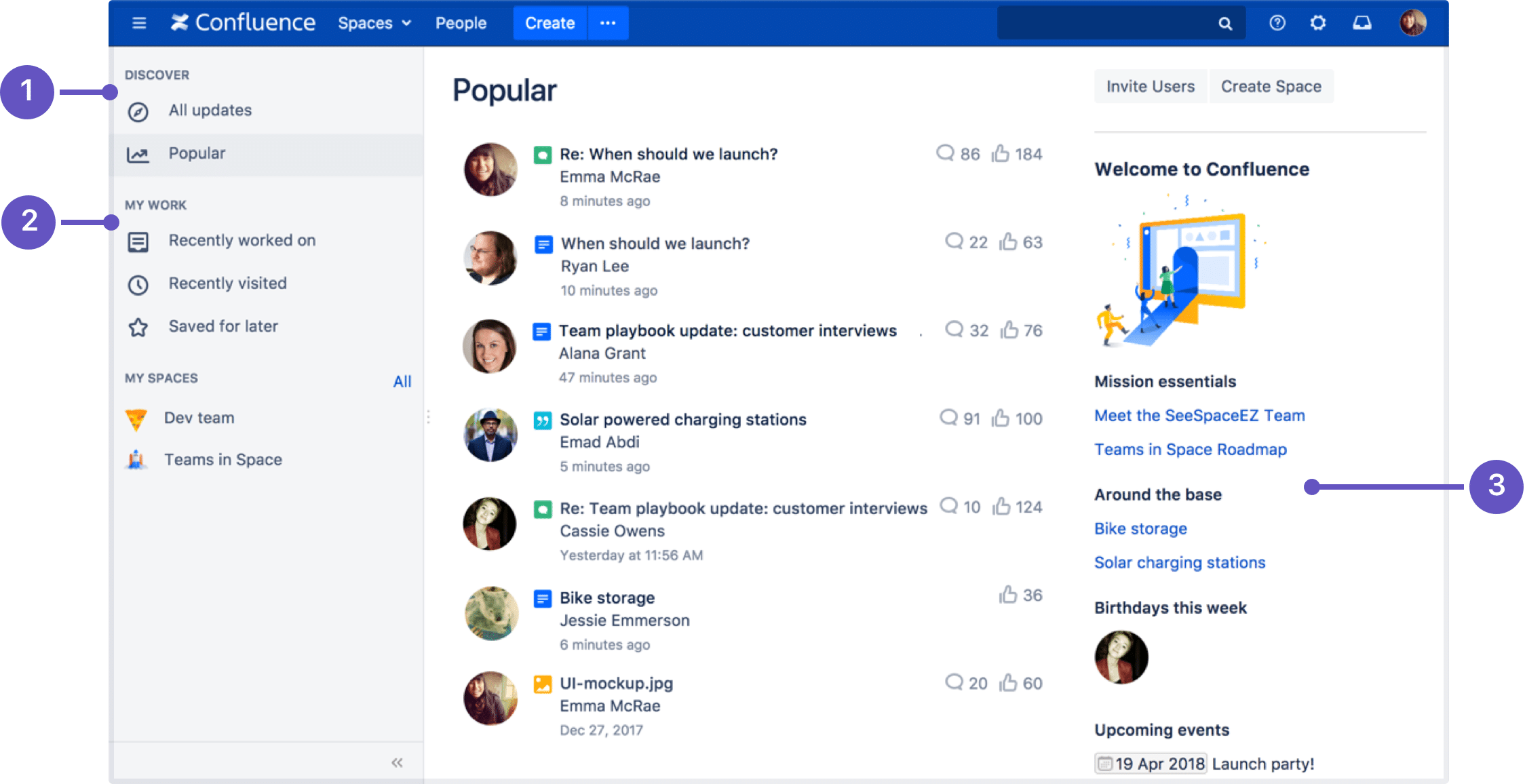
Source: Confluence
Confluence is one of the most prominent product development software in the market that offers a structured approach to documentation. It is a centralised platform where you can create, organise, and share product-related documents, roadmaps, meeting notes, and more. Since Atlassian makes it, you can connect Confluence to Jira and Trello to fit your existing workflows.
Ultimately, Confluence is a remote-friendly workspace for documentation and knowledge sharing. With its user-friendly interface and collaborative features, product managers can keep everyone on the same page and aligned towards the product’s goal.
PROS:
- Great for shared collaboration work
- Structured documentation
- Integration with Jira and Trello
- Access to a large number of templates and macros
- Granular access control
CONS:
- Advanced features cost more
- Limited offline access
- The learning curve for new users
- Some essential features come as paid plugins
- Search functionality limitations
PRICING:
- Free: $0/user/month
- Standard: $5.75/user/month
- Premium: $7.00/user/month
- Enterprise: Custom pricing
Notion
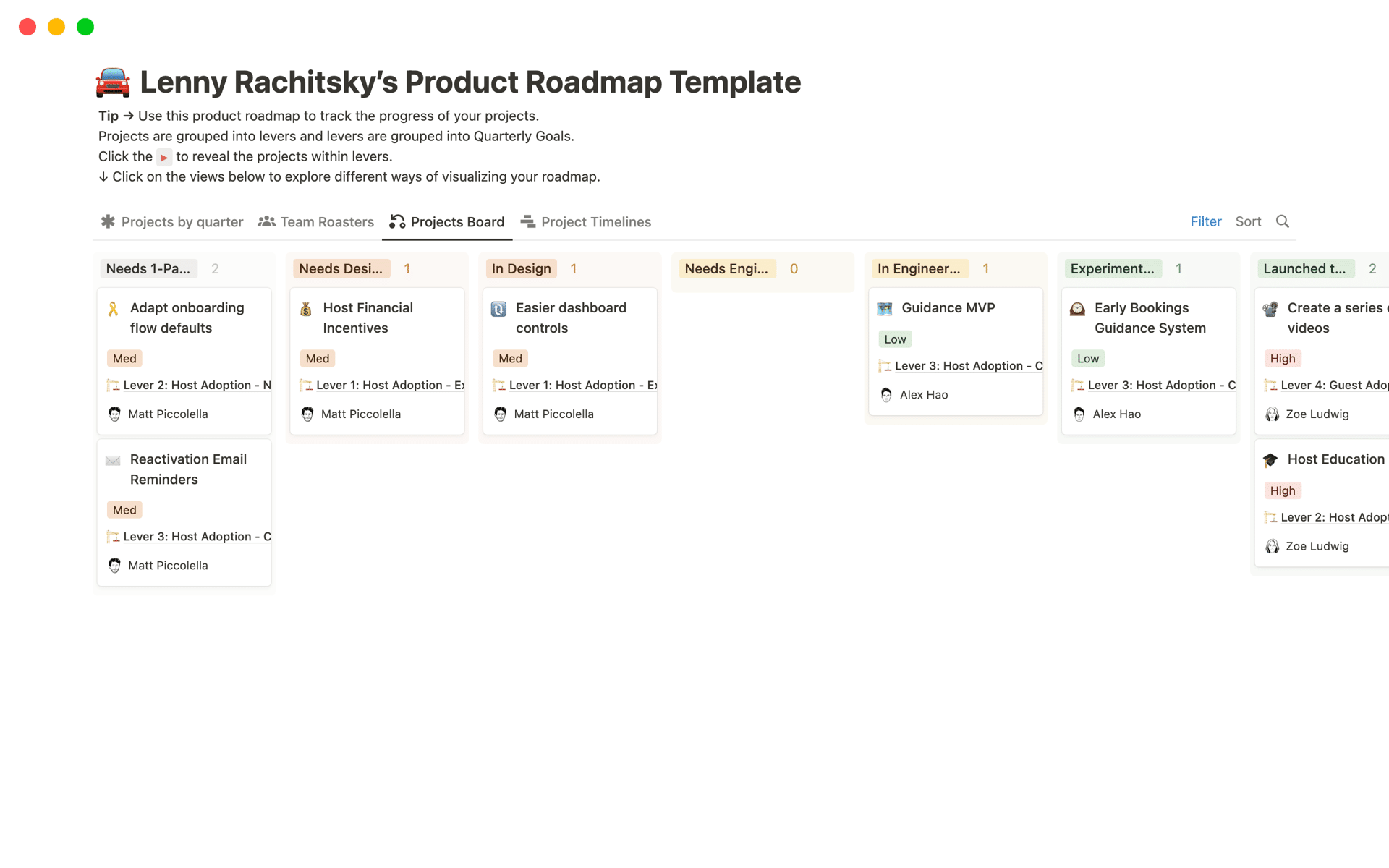
Source: Notion
Notion is a reasonably new player in the industry, but they’ve already amassed many users throughout the years. It’s a collaborative workspace that offers a customisable approach to documentation and knowledge sharing. This product development software has an intuitive UI and a wide range of templates to suit your needs as a product manager. It’s superb for creating product roadmaps, tracking tasks, and documenting important decisions.
PROS:
- Highly flexible and customisable
- User-friendly interface
- Supports various content types
- Cross-platform access
- Collaborative features
CONS:
- Lacks advanced product management features
- Limited native integrations
- No goal-tracking features
- No reporting tools
- It can be overwhelming for some users
PRICING:
- Free: $0/user/month
- Plus: $8/user/month
- Business: $15/user/month
- Enterprise: Custom pricing
Best product development software for customer relationship management (CRM)
Salesforce Service Cloud – best for case management
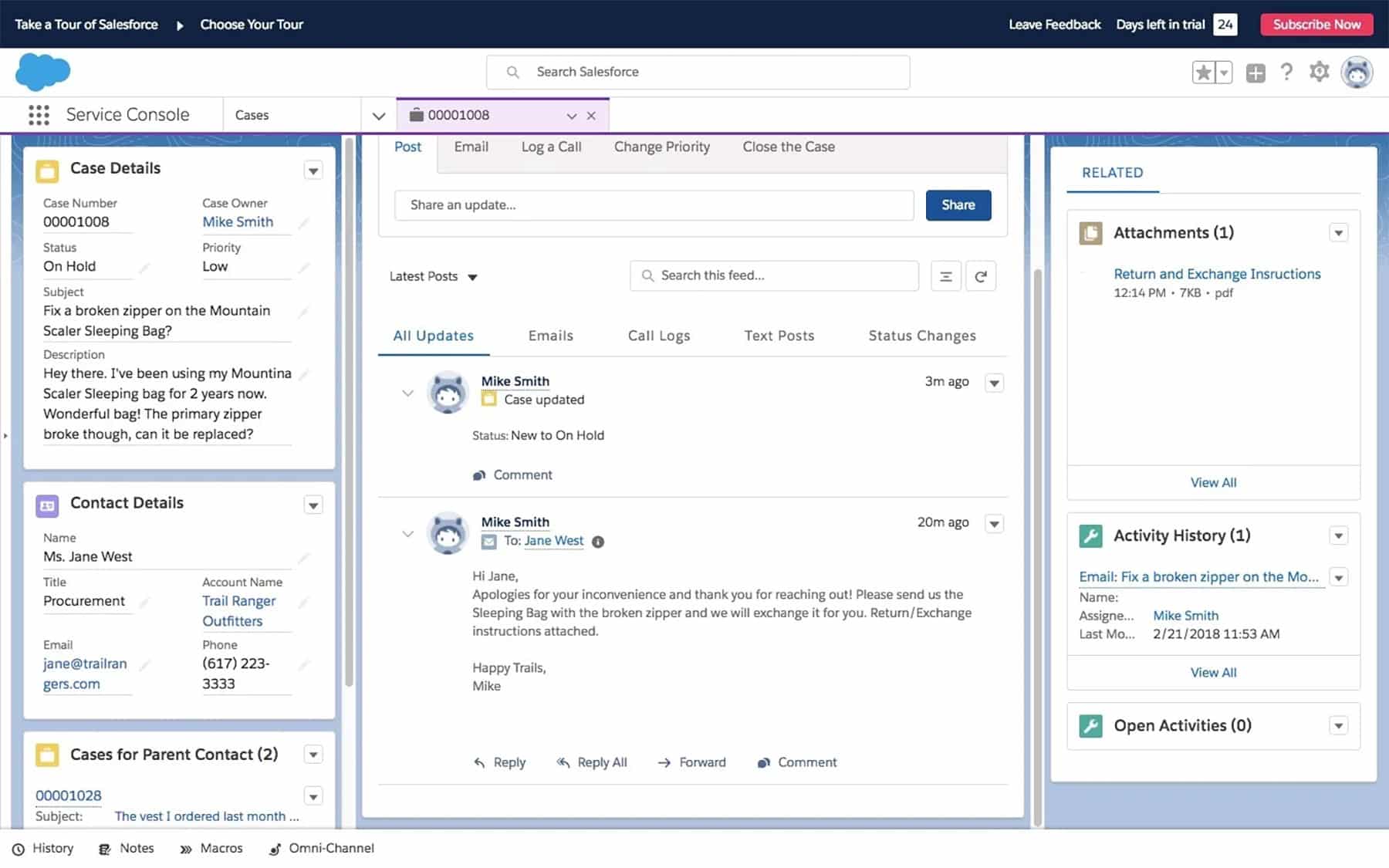
Source: Hongkiat
Salesforce Service Cloud is a specialised customer relationship management (CRM) tool to optimise customer service and support operations. It excels in managing customer feedback, inquiries, and complaints – all potent sources of customer insights for teams to leverage.
Salesforce Service Cloud is also a goldmine of customer information. By using this product development software, product teams get access to first-hand knowledge of what customers want. Once you can access such information, you can prioritise work and deliver value through superior features and solutions.
PROS:
- Multiple case management
- Collaboration between support and product development teams
- Access to customer insights
- Integrates well into the Salesforce ecosystem
CONS:
- The learning curve for beginners
- Cost-prohibitive for smaller companies and startups
- Heavy configuration required
- Integration complexity
PRICING:
- Starter: $25/user/month
- Professional: $80/user/month
- Enterprise: $165/user/month
- Unlimited: $330/user/month
Best product development software for workflow automation
Zapier – best for workflow automation
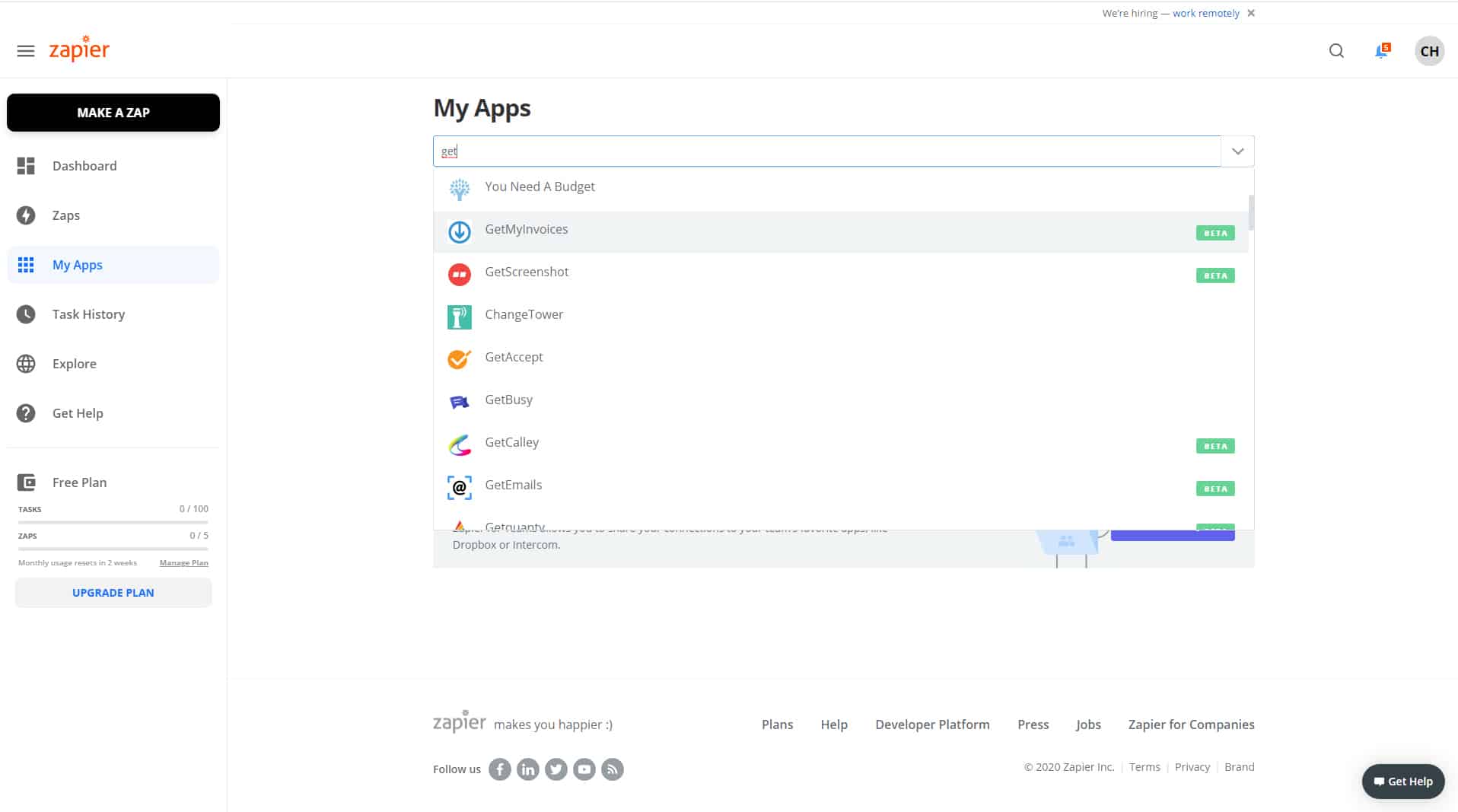
Source: GetMyInvoices
Product managers constantly deal with workloads coming from different angles. Many product managers rely on product development software like Zapier to get more tasks done. Zapier is a powerful automation tool connecting and sharing data with over 5,000 apps.
It can easily streamline your product development process with access to many third-party apps and speed up your team’s workflow. Some of the most notable features Zapier offers include multi-step “zaps”, paths, filters, schedules, webhooks, and more.
PROS:
- Superb task automation
- The sheer amount of third-party app integrations
- Easy to set up and implement
- No-code simple and repeatable workflows
CONS:
- Complex workflows require technical expertise
- Cost-prohibitive pricing structure
- Dependency on third-party app services
- No mobile version is available
PRICING:
- Free: $0/month
- Starter: $19/month
- Professional: $49/month
- Team: $69/month
- Company: Custom pricing
Latest Posts
Machine Learning In Finance: 12 Essential Applications
The impact of machine learning on finance is significant. Thanks to this technology, financial institutions are now equipped to make efficient decisions. Through the analysis of data sets, machine learning […]
How To Create Interactive Compliance Training For Bank Employees
Banking compliance training isn’t just another task. It’s the stage where everything else performs. Banks must navigate a myriad of regulations and laws. After all, this is a trust-driven, high-stakes […]
How Fintech Apps Are Using Gamification To Increase User Engagement
Discover how gamification in fintech is revolutionizing financial engagement, making banking fun & boosting user loyalty.
